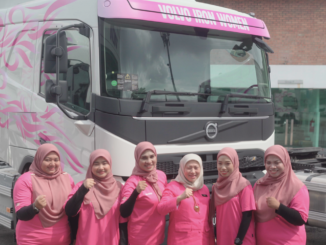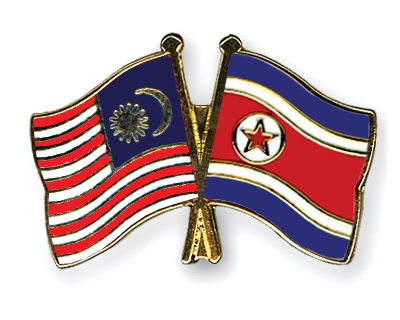Why are Malaysians working in Singapore paid less than locals? We ask Singaporean recruiters

- 2.5KShares
- Facebook2.2K
- Twitter20
- LinkedIn54
- Email60
- WhatsApp179
I signed the employment contract of my first job as a recruiter with a Singaporean recruitment firm 3 days before my convocation ceremony at my university. It was my proudest personal achievement, securing a full time position in less than 2 months compared to my friends – and 2.6 times more too! (That was in early 2015.)
Convocation day itself, my friends congratulated me, lecturers patting me on my back saying “Well done! Earning more than me already!” The pay that I got? $1,800.
I didn’t see $1,800 though; I saw around RM5,000 and that was a lot – as a fresh graduate in Malaysia.
By September 2015, the exchange rate hit a historical SGD1.00 to RM3.00. Then in 2016, with an increment and commissions, I planned to buy a house, a car in Malaysia, get married and get on with my plan to start on my PTPTN loan.
I had also wanted to settle down in Singapore with their good governance, infrastructure, security and Western-influenced culture, but with an average pay of $2,800 (RM8,400) – that was when I quickly realised that I wasn’t as financially stable/successful as I thought myself to be.

As I recruit junior to mid-level talents for companies, I realised that fresh diploma graduates expect $2,500 and fresh university graduates expect $3,000-$3,500 for their first job. I was obviously underpaid, even with a year of working experience back then!
Curious, I decided to ask my clients/companies why Malaysians (or non-Singaporeans) are paid lesser than Singaporeans. Here are a few reasons.
1. Familiarity with the Land
Face it. You’re a foreigner in a foreign land. The xenophobic part in you is already ringing a few bells after reading the word ‘foreigner’. You shun the labourers you bump into at the mall, now reverse the roles.

From a recent coffee chat with Mr. Tan (not his real name), a Manager of a Singaporean sales consultancy firm on the topic, he said:
“It wouldn’t make sense for me to hire someone who isn’t even familiar with Singapore to speak to my clients let alone give them a standard salary?
Imagine the confusion and frustration that my staff will cause if my staff cannot communicate with our clients on simple geography? How will my firm be perceived if I hire too many non-Singaporeans?” – Mr Tan, manager at a Singaporean sales consultancy
I can hear some of you fetching your pitchforks and torches already but hear me out. This is just a specific example of a rusa masuk kampung but from an employer’s standpoint, it’s all about maintaining an efficient business – no hate.
Singapore may be small in geography, but it is dense. With almost 8000 people per square kilometer, Singapore tops the chart at #3 of the highest population density of the world. So, to remember every cafe, every building and every MRT & LRT station (there are 106) in Singapore then use it in your everyday correspondence with clients/colleagues – it’s going to take a while.
Recruiter’s advice: Don’t sweat it. Over time and with some effort to integrate into the Singaporean society, this will be just a reason less applicable to you. However, if you’re a fresh graduate and needing some luck to land your first job in Singapore, equip yourself too, with knowledge of the country before going for your interview
2. Your English Proficiency
Almost a month ago, I was assisting Joanna (HOD of a private lab facility) where she frequently hires Malaysians as Lab Analysts and Technicians for their hardworking-ness and their willingness to work on responsibilities outside their job scope.
Joanna had once confided with me that as much as she wants to promote her Lab Analysts internally, she’s unable to do so because of their command of language.
I asked Joanna defensively on what did she mean – and she said;
“If we are talking about communicating informally among colleagues, there isn’t any problem. But the hires that I employ, are unable to converse on a professional level with my Directors and VPs who are usually from the Western HQs.
Many Malaysian graduates that I personally hire, do not use English as their main language of communication among their peers. It is quite evident when they converse in English with me.”
This may or may not be applicable to you however, the takeaway from this is that Singaporeans perceive Malaysians as bad English communicators – at least not as proficient as Singaporeans.
Singapore’s high education standards has made sure that every Singaporean has a certain standard of English. It’s easy to manage with a dense and (relatively) small population.
Take this Primary 6 English question in Singapore for example:
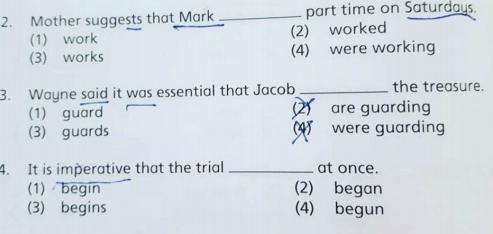
In comparison, this is our UPSR’s English paper:
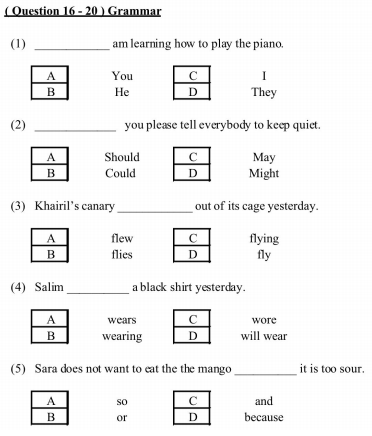
K la, stop hantam-ing me for hantam-ing our Malaysian English education standards. You get it, though. City dwellers in Malaysia have a high proficiency in the language however, not every Malaysian who works in Singapore are from the city.
You’d see why Singaporeans perceive Malaysians’ command of the language as inferior.
Recruiter’s advice: With strong reference to the previous point, if you want to make it in any country. Make a conscious effort to first polish your command of the dominant language – in any country.
3. Our Willingness to Take a Low Pay
But what is a low pay after all? If someone offered you RM5,400 to start cleaning toilets in Singapore tomorrow, many of us would take it up immediately.
Even our own graduates at home are turning to the latrines – what more a job that pays 3x more? Advertently, this creates a perception of Malaysians as cheap labourers in every industry here in Singapore.
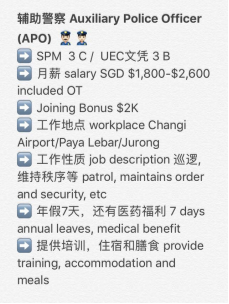
To achieve $2,600 of salary as advertised as above, one would need to work 7 days a week and more than 12 hours a day. It is no wonder that CISCO (private security company that hires a huge number of Malaysians in their workforce) are facing a talent shortage. As reported by the local press in 2016, the company is even looking out to Taiwanese talents to fill their vacancies.
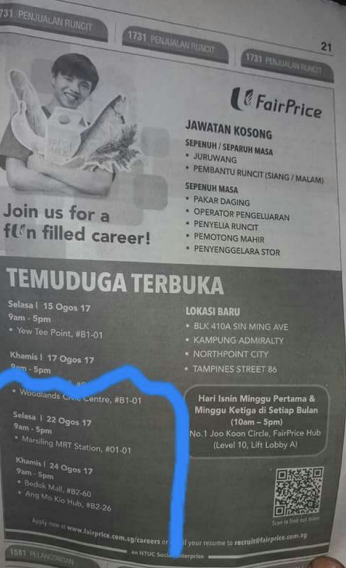
From positions from shipyard crews, airport technicians and manufacturing labourers; many Malaysians – even with University degrees taking up these sai kang (literal translation from Hokkien: ‘shit jobs’) that local Singaporeans shun.
This in effect, creates a prejudice, that Malaysians are of a lesser class, desperate for the Dollar and hence looked down upon.
Recruiter’s advice: Admittedly, I have always suggested Malaysians as an alternate source of talents when companies and myself are unable to source for candidates for difficult-to-fill jobs. Make sure you know your worth before considering/accepting a job offer. It’s quite likely a role that the locals may not even want.
I’ve hired a fresh Computer Science graduate from UPM for a computer technician job. Job responsibilities include, hardware failure standby, installing new printers for computers, connecting video cables to displays. $2,200 – for a fresh grad.
4. Hiring Malaysians or Singaporeans is like choosing between a store brand salt and Organic ‘Fleur De Sel’ salt
Not insinuating that both are salty but the point is that why pay more for the same profile of people? I spoke to Chee Meng (hiring manager of a local delivery company in Singapore) and this was his comment on hiring non-Singaporeans for his team;
“They (Malaysians) are hardworking and do not complain as long as you treat them well. Do you think Singaporean youngsters would want to work these kind of jobs? $3,000 also not enough for them!”, joked Chee Meng
However, Chee Meng isn’t alone with this idea. In fact, most companies reserve their foreigner work pass quotas for low paying jobs to reduce hiring costs.
Juxtaposing the average monthly salaries of two ACCA certified Accounting fresh graduates of a Singaporean and a non-Singaporean;
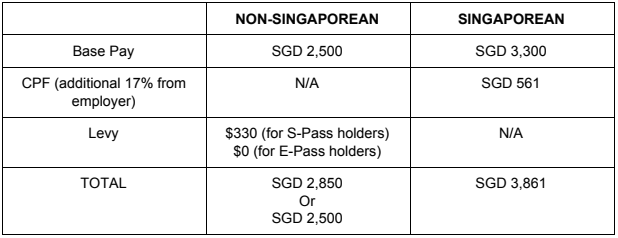
That’s a whopping $1,011 difference – and both can get the same work done! If you were a business owner, which would you hire?

Recruiter’s advice: If you’re a fresh graduate and seeking employment in Singapore, work in Malaysia first – where the odds against you are lower. In Malaysia, you’re not an orang asing but a local with resources and networks.
Use these to your advantage to build a colourful resume and only then, seek employment elsewhere.
Otherwise, risk being underpaid and overworked with no career progression all in favour of a slightly significant higher pay.
So is the grass greener on the other side?
To a certain degree, it’s quite accurate for many Malaysians in this economic landscape. But to what extremes and levels of discomfort would Malaysians have to endure, to enjoy the fresh green grass and bring some back to our families?
In fact, some say that the quality of life in Malaysia is much better. We are proud car owners, proud home-owners (public houses in Singapore have a 99 year lease, usually never freehold) and 24/7 access to cheap and delicious food.
There’s no cure-all solution to succeed in Singapore. In fact, geography is irrelevant to being successful. Work hard, know your worth and constantly hone your skills.. who knows? You may just see yourself in Forbes in the future.
- 2.5KShares
- Facebook2.2K
- Twitter20
- LinkedIn54
- Email60
- WhatsApp179

